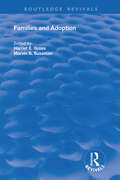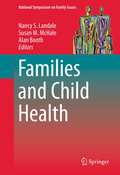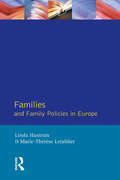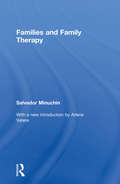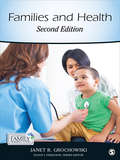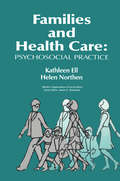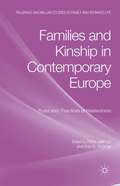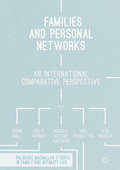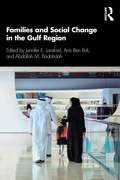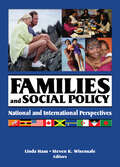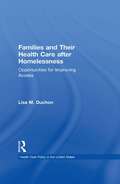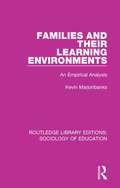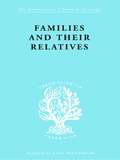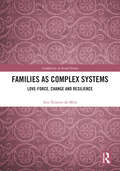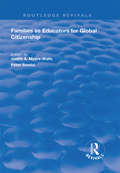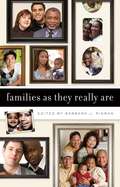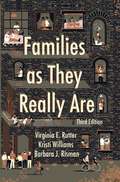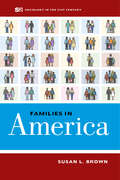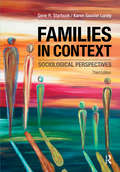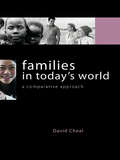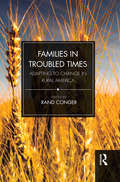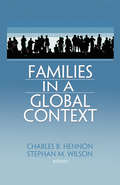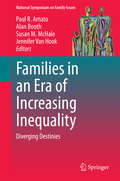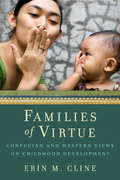- Table View
- List View
Families and Adoption
by Harriet Gross Marvin B SussmanDo parents with adoptive children see themselves as similar to or different from nonadoptive parents? Is the stigma attached to adoption lessening? Does open communication about adoption contribute to the family's well-being? How successful are adoptive adults at putting their adolescent turmoil behind them? These and many other important and complex questions are addressed in Families and Adoption, an informative guidebook that shows you how adoption is both a condition and a lifelong process. Families and Adoption discusses legislation that can serve the needs of various members of the adoptive experience to deepen your understanding of the key legal issues associated with consent and openness. It also provides you with detailed coverage of changes in adoption law, open adoption research results, transracial and transethnic adoption, and the consequences of placing versus parenting for unmarried, teenage women who give birth. Graduate students, social workers, adoption professionals, members of adoptive families, and couples wishing to adopt will find there isn't a rock that Families and Adoption leaves unturned. It presents you with vital information on the following topics: the developmental stages of reunion between an adoptive child and birth parent, notions of adoption, parenthood, and kinship and how these notions are challenged after a reunion has taken place, the institution of adoption as it has existed for decades in American society, international adoption, respecting the bonds children have and helping them develop critical attachment skills, those who “accept” open-adoption and those who “embrace” it, flexible parenting styles and their positive effect on developmentally vulnerable adoptees. A skillful blend of personal adoption experiences and research studies, Families and Adoption explores the special issues adoption presents and how all parties involved can work together to improve placement decisions, ensure that a woman is confident in her decision to relinquish her child, and help families select the most appropriate adoption arrangement. The book's main strength is that it doesn't just look at the initial considerations of adoption; it prepares you for the issues that will arise along the way.
Families and Child Health
by Alan Booth Nancy S Landale Susan M MchaleIn recent years, there has been an explosion of research on the early origins of adult health. A growing body of evidence documents that maternal health before conception, prenatal and perinatal exposures, and conditions in childhood play critical roles in health over the life course. Scientific understanding of the multiple and interacting influences on child health and their role in later health continues to evolve rapidly, but greater attention to how families shape the conditions of early life that underlie childhood health is needed. This volume aims to advance understanding of this topic, with attention to mechanisms through which health disparities emerge and are sustained across the lifespan.
Families and Family Policies in Europe
by Linda Hantrias Marie-Therese LetabilerThe family is currently a controversial topic both within the UK and Europe. While demographic trends seem to suggest that family structures and attitudes within the European Union are converging and that member states are facing similar social problems, their policy responses are very different. This book examines the differences between these national responses and that of the EU as contained in the social chapter. It analyses the key concepts underlying the formulation of family policy and illustrates it with the latest data much of it hitherto unpublished.
Families and Family Therapy: Journeys Of Growth And Transformation (Social Science Paperbacks Ser.)
by Salvador MinuchinThis special edition of the classic text includes a new introduction from Professor Arlene Vetere exploring its continuing influence on contemporary practice. One of family therapy’s foundational texts, Families and Family Therapy is as relevant today as it has ever been. Examining the therapist’s role, Dr. Minuchin presents the views and strategies of a master clinician in a clear and practical form. Transcripts of actual family sessions—both with families meeting their problems fairly successfully and those seeking help—are accompanied by a running interpretation of what is taking place. The book constructs a model of an effectively functioning family and defining the boundaries around its different subsystems, whether parental, spouse, or sibling. It then explores the ways in which families adapt to stress from within and without, as they seek to survive and grow. Combining vivid clinical examples, specific details of technique, and mature perspectives on both effectively functioning families and those seeking therapy, this is an important text for all those interesting in the theory and practice of family therapy. This book can be used on courses such as Family Therapy, Family Interventions, Systemic Practice, and Systemic Counselling within departments of Psychology, Mental Health, and Counselling; and by undergraduate students on Social Work qualifying courses.
Families and Health
by Janet R. GrochowskiThis interdisciplinary text examines five different components of family health--biology, behavior, social-cultural circumstances, the environment, and health care--and the ways they affect the abilities of family members to perform well in their homes, workplaces, and communities. Special awareness is paid to health disparities among individuals, families, groups, regions, and nations. The author discusses how health of individual families influences our local, national, and global communities. Families and Health argues that family health is not a privilege for the few, but a personal, national, and global right and responsibility.
Families and Health Care: Psychosocial Practice (Modern Applications Of Social Work Ser.)
by Kathleen EllFirst Published in 2018. Routledge is an imprint of Taylor & Francis, an Informa company.
Families and Kinship in Contemporary Europe
by Riitta Jallinoja Eric D. WidmerInstead of seeing the family as a 'monolithic' entity, as though separate from its surroundings, this new approach draws attention to assemblages of various types that in different constellations and through different transactions relate people to each other as families and kin.
Families and Personal Networks
by Eric D. Widmer Vida Česnuitytė Karin Wall Jacques–Antoine Gauthier Rita GouveiaThis book critically assesses the main features of the modernization of family life and personal relationships by examining and comparing three European countries with different social and political pathways: Portugal, Switzerland and Lithuania. Drawing on national surveys of family trajectories and social networks, the contributors highlight personal and family relationships through the lens of network and life course perspectives as well as gender and generational perspectives. Providing innovative, comparative findings on families and personal networks through the use of diverse methodologies, this edited collection will be of interest to scholars, students and policymakers across a range of social science disciplines.
Families and Social Change in the Gulf Region
by Jennifer E. Lansford Anis Ben Brik Abdallah M. BadahdahThis timely volume explores the impact of dramatic social change that has disrupted established patterns of family life and human development in the countries of the Gulf Cooperation Council. It addresses several major deficits in knowledge regarding family issues in the Gulf countries, bringing a critical perspective to the emerging challenges facing families in this region. Lansford, Ben Brik, and Badahdah examine the role of urbanization, educational progress, emigration, globalization, and changes in the status of women on social change, as well as tackling issues related to marriage, fertility and parenthood, and family well-being. This book explores how family relationships and social policies can promote physical health, psychological well-being, social relationships, safety, cognitive development, and economic security in the Gulf countries, placing a unique emphasis on contemporary families in this region. Families and Social Change in the Gulf Region is essential reading for scholars from psychology, sociology, education, law, and public policy. It will also be of interest to graduate students in these disciplines.
Families and Social Policy: National and International Perspectives
by Steven K. Wisensale Linda HaasEmpirical research that describes ways to best handle social problems concerning familiesLeading authorities&’ studies show that from the effects of globalization many social and family problems and their solutions tend to be similar in nations world-wide. Families and Social Policy: National and International Perspectives explores
Families and Their Health Care after Homelessness: Opportunities for Improving Access (Health Care Policy in the United States)
by Lisa M. DuchonFirst published in 1999. Routledge is an imprint of Taylor & Francis, an informa company.
Families and their Learning Environments: An Empirical Analysis (Routledge Library Editions: Sociology of Education #34)
by Kevin MarjoribanksFirst published in 1979, this study is one of the first works of educational research to include detailed assessments of family environments in an analysis of performance of children at their schools. Much of the research is based on data collected from families in Australia, Canada and England and the findings have been integrated with results from other family environments research. The study also explores social and psychological conceptual positions that will have relevance for further educational investigations. This book will be of particular interest to those studying the relationship between family environments and education, as well as the sociology of education.
Families and their Relatives: An Anthropological Study (International Library of Sociology)
by Hubert Firth Forge FirthAs increased access to employment and educational opportunities brought dramatic changes to women's lives, sociologists began to look at the effect of women's changing roles on their children and families. Based on empirical investigations and personal experience, the studies included in the volumes of The Sociology of Gender and the Family set of The International Library of Sociology set out to establish patterns and regularities in social behaviour, and to understand the social roles of kinship groups, mothers, wives, children and the elderly.
Families as Complex Systems: Love-Force, Change and Resilience (Complexity in Social Science)
by Ana Teixeira de MeloThis book presents an innovative framework for conceptualising families as complex systems and for understanding and supporting positive change, adaptation and resilience. The development of this framework was based on a qualitative and abductive research process targeting change and resilience processes in multi-challenged families.The theoretical novelty of this book is mostly expressed in the notion of Love-Force: a relational force emerging from the coupling processes between individuals with potential transformative effects on them, their interactions and environments. This book introduces a new vocabulary for understanding the complexity of families as complex systems and their change and resilience processes. Love-Force is presented as a supreme expression of the complexity of families and human bonds. It elaborates on the complexity of the family bonds, on the relation of Love-Force to change and resilience and its contributions to the conceptualisation of the Potential for Family Change.Raising important theoretical and methodological challenges and questions, it presents a guide for future interdisciplinary research in the domains of complexity and family sciences and advances in practice. As such, it will be of interest to anyone interested in the complexity of human relations and to complexity scientists as much as family theorists, researchers and practitioners.
Families as Educators for Global Citizenship (Routledge Revivals)
by Judith A. Myers-Walls Péter SomlaiThis title was first published in 2001. All people and regions of the world are deeply affected by world events, no matter how closely they embrace or how actively they try to resist their impact. This book explores some of the ways globalization has changed and formed children, youth, and families. It defines some of the ways that culture, politics, religion and world events have altered the attitudes, behaviours and well-being of families. It also outlines some of the approaches that families have taken and could take, in adapting to the changing world around them. Authors provide perspectives from over 20 countries and from many professional backgrounds, including sociology, psychology, religion, political science, peace studies, environmental studies and economics. Suggestions are given for future research studies, interventions with families and the construction of public policies.
Families as They Really Are
by Barbara J. RismanFor students and general readers, Risman (U. of Illinois at Chicago) brings together 40 essays by members of the Council on Contemporary Families, an interdisciplinary community of historians, social scientists, and other experts who study and work with families, on how families operate in everyday life, how they got to where they are today, research on the topic, families and relationships in the twenty-first century, youth and social class in the twenty-first century, and the impact of the gender revolution. They incorporate new articles with the Council's Briefing Papers, press releases, and newspaper articles based on them and provide information meant to lead to better social policy. Topics include differences in childhood over the last three centuries, how professional African Americans pioneered the modern marriage, sex, cohabitation, same-sex marriage, interracial marriage, parenting, divorce, immigrant families, child care, children's poverty, men's contributions to the household, and gendered violence.
Families as They Really Are (Third Edition)
by Barbara J RismanThis purchase offers access to the digital ebook only.
Families in America
by Susan L. BrownIn this accessible, engaging, and up-to-date course book, Susan L. Brown employs ethnographic vignettes and demographic data to introduce students to twenty-first century perspectives on contemporary families. Appropriate as a primary or secondary text in classes on family and marriage, this book probes momentous shifts in the definition of family, such as the legalization of same-sex marriage and policy debates on welfare reform and work-family issues. Brown also explores the rise in nonmarital childbearing and single-mother families and the decline of “traditional” marriage by delving into the historical roots of family change, current trends of family formation and dissolution, and the implications of family change for the well-being of adults and children. With a lens toward socioeconomic inequality and racial-ethnic variation in family patterns, Families in America illustrates how family diversity is now the norm. The Sociology in the Twenty-First Century series introduces students to a range of sociological issues of broad interest in the United States today, with each volume addressing topics such as family, race, immigration, gender, education, and social inequality. These books—intended for classroom use—will highlight findings from current, rigorous research and demographic data while including stories about people’s experiences to illustrate major themes in an accessible manner. Learn more at www.ucpress.edu/go/sociologyinthe21stcentury.
Families in Context: Sociological Perspectives
by Gene H. Starbuck Karen Saucier LundyThe most thoroughly updated edition yet, this book offers students perspectives of changes in marriage and family over time, including the impact of the Great Recession and of new media technologies. A hallmark of Families in Context remains the well-researched, data-driven quality of the text. Beyond presenting thoroughly updated statistics and literature, each chapter examines new trends and assesses their implications for students' lives. The underlying presentation remains balanced, theoretically grounded, and accessible to a wide variety of classes, allowing students of all ages and family backgrounds to draw their own conclusions about controversial topics. Features of the new edition include coverage of the Affordable Care Act; new social media and families; the latest trends in poverty, education, social mobility, gender, identities and healthcare; updated 'In the News' features and author-created PowerPoint slides.
Families in Focus: New Perspectives on Mothers, Fathers, and Children
by Judith Bruce Cynthia Lloyd Ann LeonardThis Population Council Report shows that, in rich and poor countries alike, parent-child bonds are unraveling and that women carry much more significant economic and social responsibilities for the family than commonly believed. The authors of this book urge policymakers and researchers to focus on strengthening parent-child ties and to look beyond the myth that all families are stable and cohesive units in which the father serves as economic provider, the mother serves as emotional caregiver, and all children are treated equally well.
Families in Today's World: A Comparative Approach
by David ChealAn international textbook designed as a quick introduction for students from around the world studying sociology of family, this text provides comprehensive coverage of the major topics in the sociology of family life. Written in an easy access style it opens with a chapter on defining family and family structures. It then moves on to discuss over a dozen major topics; from interaction and meaning in families to sexuality. David Cheal provides coverage of these topics by drawing on a variety of international material. Most of the studies focus on contemporary family life but Cheal also presents information on historical changes which have shaped family life as it is known today. This book an incredibly valuable teaching tool as it presents diversity in family patterns through thinking about family life from a global perspective.
Families in Troubled Times: Adapting to Change in Rural America (Social Institutions And Social Change Ser.)
by Rand CongerThis book documents the experiences of rural Iowa families, who lived through the "farm crisis" years of the 1980s, in a fashion that might help families of the future cope more successfully with economic reversals. The documentation could be used to fashion more effective social policies.
Families in a Global Context
by Charles B. Hennon and Stephan M. WilsonLearn what trends and factors are influencing families globally How are families the same or different around the world? Families in a Global Context puts the similarities and differences into perspective, presenting an in-depth comparative analysis of family life in 17 countries around the world. Contributors discuss different countries' family life by using a standard framework to review major influences and patterns. The framework allows readers to do comparative reflection across several countries on a variety of daily living elements, including social and economic forces such as urbanization and modernization, changes in gender/courtship/spousal patterns, and war. This book provides an informative illustration of current as well as future trends of family life worldwide. Each chapter in Families in a Global Context describes customary types of family patterns within each country’s social organization and culture. Important social, economic, political, and other trends are explored in detail, and major ethnic, religious, or other subcultures are noted emphasizing marriage and family patterns that differ from the more typical ones. The book is extensively referenced and includes tables to clearly present data. Countries explored in Families in a Global Context include: European countries of Wales, Sweden, Germany, Romania, and Italy African countries of Sierra Leone, South Africa, and Kenya Middle Eastern countries of Turkey and Iran Asian and Oceanian countries of India, China, the Philippines, and Australia Latin American countries of Brazil, Mexico, and Cuba Topics discussed for each country in Families in a Global Context include: demographics mate selection patterns with an emphasis on the dynamics of couple formation marital roles the place and role of children and parenting in families socialization for gender roles differences in education, employment, and other opportunities major stressors affecting families, coping, and adaptation aging and life expectancy issues and much more! Families in a Global Context is an insightful resource for researchers, educators, and advanced undergraduate and graduate students investigating comparative family topics of family life around the world and in cultural context.
Families in an Era of Increasing Inequality
by Alan Booth Susan M. Mchale Paul R. Amato Jennifer Van HookThe widening gap between the rich and the poor is turning the American dream into an impossibility for many, particularly children and families. And as the children of low-income families grow to adulthood, they have less access to opportunities and resources than their higher-income peers--and increasing odds of repeating the experiences of their parents. Families in an Era of Increasing Inequality probes the complex relations between social inequality and child development and examines possibilities for disrupting these ongoing patterns. Experts across the social sciences track trends in marriage, divorce, employment, and family structure across socioeconomic strata in the U. S. and other developed countries. These family data give readers a deeper understanding of how social class shapes children's paths to adulthood and how those paths continue to diverge over time and into future generations. In addition, contributors critique current policies and programs that have been created to reduce disparities and offer suggestions for more effective alternatives. Among the topics covered: Inequality begins at home: the role of parenting in the diverging destinies of rich and poor children. Inequality begins outside the home: putting parental educational investments into context. How class and family structure impact the transition to adulthood. Dealing with the consequences of changes in family composition. Dynamic models of poverty-related adversity and child outcomes. The diverging destinies of children and what it means for children's lives. As new initiatives are sought to improve the lives of families and children in the short and long term, Families in an Era of Increasing Inequality is a key resource for researchers and practitioners in family studies, social work, health, education, sociology, demography, and psychology.
Families of Virtue
by Erin M. ClineFamilies of Virtue reads a range of thinkers and scientists, from ancient Greek and Chinese philosophers to contemporary feminist ethicists and attachment theorists, to articulate the critical role of the parent-child relationship in the moral development of infants and children. Arguing that philosophy can support our best empirical findings to shape effective policy, this book seeks to strengthen families, help raise happier children, and successfully address current moral problems.Early Confucian philosophers argue that the general ethical sensibilities we develop during infancy and early childhood form the basis for nearly every virtue and that the parent-child relationship is the primary context within which this growth occurs. Joining these views with scientific work on early childhood, the text shows how an extensive body of research in Western psychology can bolster and renew the theoretical underpinnings of Confucian thought. Confucian philosophers can therefore help promote positive social and political change in our time, particularly in such surprising areas as paid parental leave, breastfeeding initiatives, marriage counseling, and family therapy.
